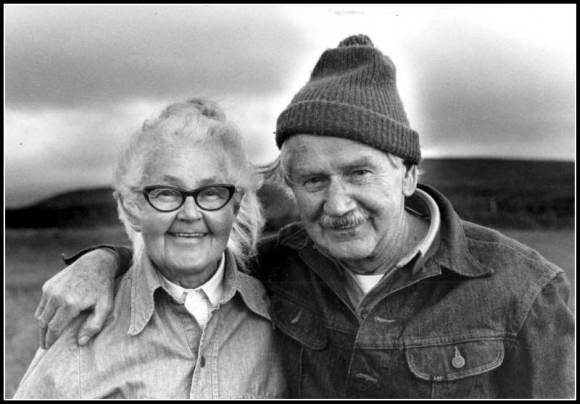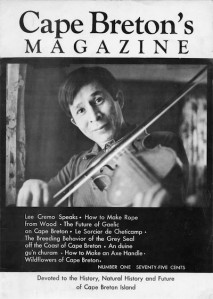
For over twenty-five years, Ronald Caplan traveled Cape Breton with a camera and tape recorder, creating Cape Breton’s Magazine.
The popular magazine about Cape Breton Island and its people became a cherished collectible. It was an over-sized publication printed on newsprint. It was packed with life stories, history, and folklore, and hundreds of photographs, old and new. It gave the Cape Breton story back to the community, became an essential tourist souvenir and reached people devoted to Cape Breton living away. The magazine was built on Ron Caplan’s conversations with older Cape Bretoners—steelworkers, fishermen, nurses and midwives and coal mining families and many more.
And then in 1999, it was over. The newsprint collections started to yellow, and a generation grew up rarely hearing about Cape Breton’s Magazine.
Now, all those issues of Cape Breton’s Magazine are back as a new website – capebretonsmagazine.com, exactly as they were originally published by Caplan and his work-partner Bonnie Thompson.
On March 18 at the Beaton Institute, Ron Caplan will launch the Cape Breton’s Magazine website. The site will contain all 74 issues, over 5000 pages. And it will be a free gift to Canada and the world.
“The website will have a lot more than the magazine,” says Caplan. “The website will be searchable and printable. It will contain curriculum examples to encourage its use in classrooms. There will be an Audio section with voices of Cape Bretoners being interviewed. It will have some related videos and a gallery of photographs. And it will have Brian Tennyson and Sandra Atwell’s detailed Guide to Cape Breton’s Magazine, so everything can be searched by Article and by Speaker or even by significant single words.”
This project was made possible with the support of the Department of Canadian Heritage through the Canadian Culture Online Strategy. In-kind contributions came from several Nova Scotia partners, including the Cape Breton-Victoria Regional School Board; the Beaton Institute archives at Cape Breton University; and the Nova Scotia Archives and Records Management. As work on the project progressed, other unofficial partners volunteered assistance, including Lou Duggan of the CBU Library and technicians at the Digital Archives Department of Memorial University.
Caplan points out that the launch party is only the beginning. “I hope the website will be a living thing. I plan to add more photographs and audio, and the curriculum section will grow as teachers use the Cape Breton’s Magazine website in their classrooms.”
Caplan expects that news about the free website will quickly travel far and wide. “By one Cape Bretoner telling another, I expect we’ll soon reach that worldwide Cape Breton community of people who love this island. From Boston to Calgary to New Zealand, I’m confident there will be people delighted to discover this website. Sure, I will be promoting the site, but I’m really counting on people to e-mail their friends and relatives.”
Caplan will also be speaking to teachers at in-services and to heritage groups around the island and beyond, introducing the Cape Breton’s Magazine website and encouraging people to tell the world about this extraordinary free gift.
Cape Breton’s Magazine has earned a reputation for being news that has stayed news. As Caplan explains, “Each issue of the magazine was deliberately built to last.” The interviews about Women in the Steel Plant and old cures and folk tales and the General Instruments plant, Fishing for Gaspereaux and Poaching Salmon—they all remain fresh today. Caplan made an effort in each issue to represent all four island counties, have a good mix of male and female speakers, rural and industrial stories, and although mostly in English, to include Mi’kmaw life and language, Gaelic, and Acadian French stories.
“Jack Yazer, Dr. Austin MacDonald, Wishie Rose, Hattie Carmichael, Frank and Margaret MacRae, Archie Neil Chisholm, Katie Margaret Gillis and hundreds more—these are the real heroes of Cape Breton’s Magazine. They speak to us through the magazine as alive for me today as the day I met them 20 and 30 years ago. Their stories help tell our story. I’m really grateful that they will be widely available again, grateful to the Partnership Fund for having made this project possible.”

Cape Breton’s Magazine ran from 1972 to 1996. Along the way it earned a wide range of awards, including the Nova Scotia Cultural Life Award, the Marius Barbeau medal of the Canadian Folklore Association, the Canadian Historical Association recognition for its contribution to Oral History. For his work, Ronald Caplan received an honorary doctorate from Cape Breton University.
Many people cherish their copies of the original magazine—but those hard copies are beginning to fade. With the new website, Cape Breton’s Magazine lives on beyond the yellowing pages of the originals. It will live and find new readers and give devoted fans a chance to read it all again.
The website will be fully searchable. Readers can search for every article with the name “MacNeil.” Or they can find the photo of a kellick. A reader can download a remembered favorite story—or every story about fishing or steel or seeing a ghost. Students can select and print out a few paragraphs or add a special quote from the magazine to their school report.
And Caplan says that he is confident that there will also be people who want to read Cape Breton’s Magazine “the old way”—that is, issue by issue, starting with Lee Cremo on the cover of Issue One. “I can imagine people treating themselves to an issue every few weeks, reading their way through all 74 magazines. At least, I like to think some people will.”
The Launch Party celebrating the Cape Breton’s Magazine website will be hosted by the Beaton Institute on Thursday, March 18, from 4 to 6 pm. Wendy Bergfeldt will be there to broadcast Mainstreet on CBC Radio. Dr. Robert Morgan, Dr. Richard MacKinnon, Jane Arnold and Catherine
Arsenau will give words of welcome. There will be refreshments–and everyone is invited to welcome back Cape Breton’s Magazine.


Dina Desveaux says
The photo that Ronald Caplan took of Hildegarde and Hans Padelt captures their spirit and could evoke the storyteller in anyone, even a novice writer such as I am.
This website is a great resource – many thanks for your work and congratulations on this latest venture!
David Crowe says
This is good news! It's good to see more magazines going online. It truly is the way of the future and a great way for publications to reach a wider audience. With print-on-demand services available these days, it doesn't have to mean print dies entirely.
Good to see this. I always enjoyed that mag.